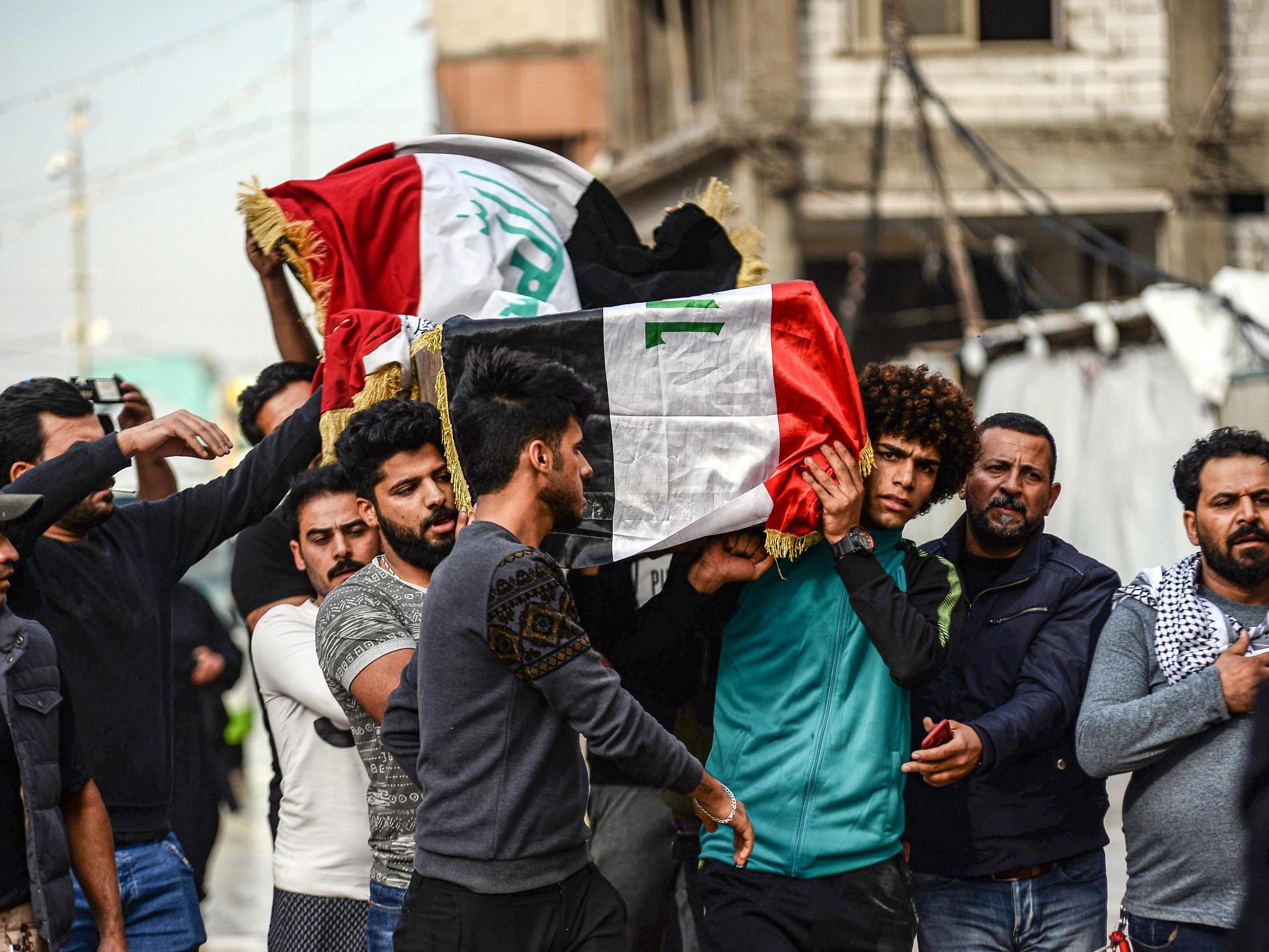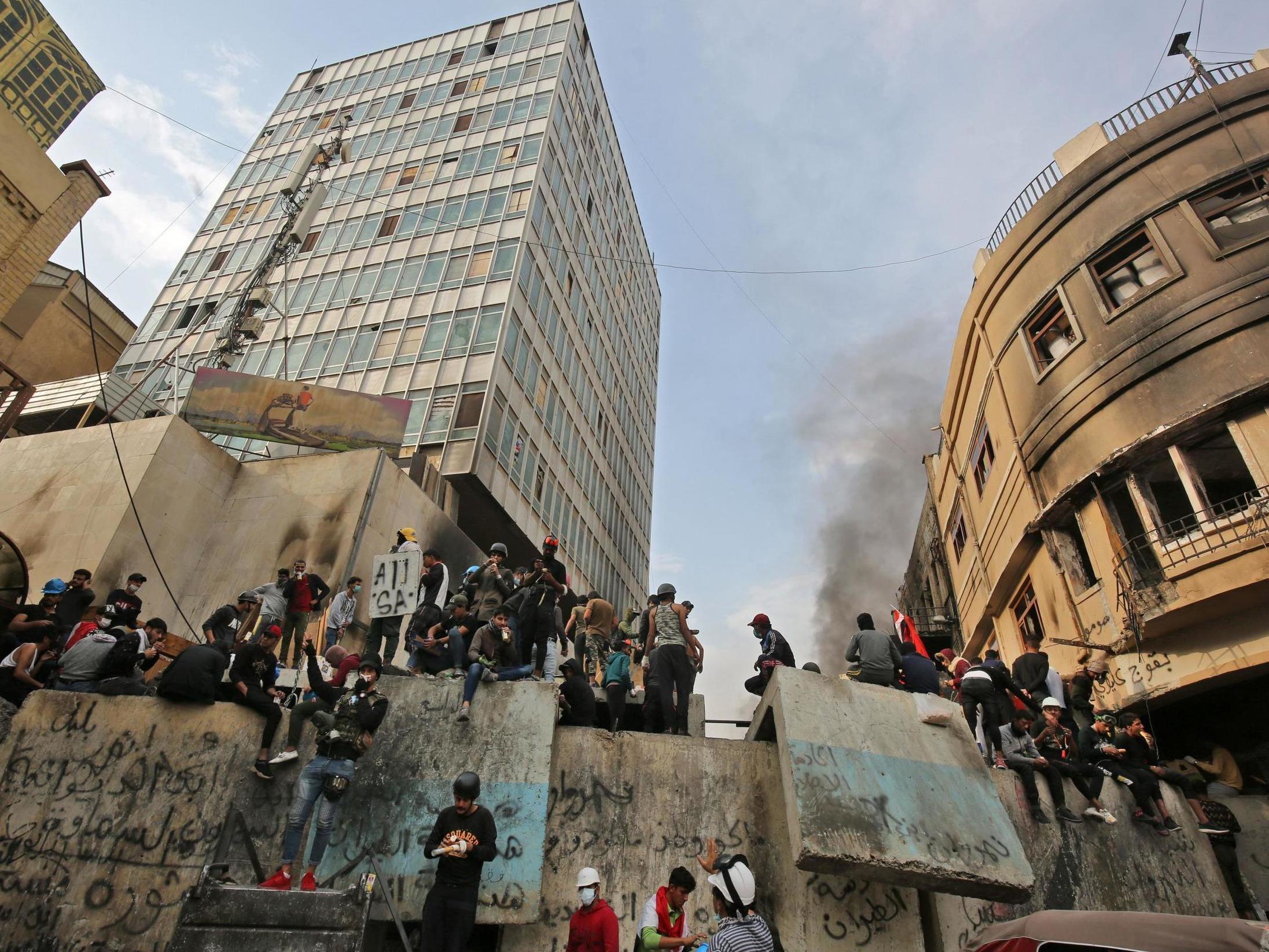Iraq: Prime minister Adil Abdul Mahdi resigns amid spiraling death toll in anti-government protests
At least 350 people killed and 15,000 injured since 1 October

Your support helps us to tell the story
From reproductive rights to climate change to Big Tech, The Independent is on the ground when the story is developing. Whether it's investigating the financials of Elon Musk's pro-Trump PAC or producing our latest documentary, 'The A Word', which shines a light on the American women fighting for reproductive rights, we know how important it is to parse out the facts from the messaging.
At such a critical moment in US history, we need reporters on the ground. Your donation allows us to keep sending journalists to speak to both sides of the story.
The Independent is trusted by Americans across the entire political spectrum. And unlike many other quality news outlets, we choose not to lock Americans out of our reporting and analysis with paywalls. We believe quality journalism should be available to everyone, paid for by those who can afford it.
Your support makes all the difference.Iraqi prime minister Adil Abdul Mahdi has said he will resign after the latest outburst of violence and unrest in the country left at least 40 protesters dead over the course of 24 hours.
The announcement was met with celebrations among anti-government demonstrators who, for the past two months, have been protesting against corruption, rising youth unemployment levels and a lack of essential services such as electricity and water.
The country has seen an intensification in bloodshed in recent days, with Mr Abdul Mahdi calling upon the government to “act in the interests of Iraq; to preserve the blood of its people; and to avoid slipping into a cycle of violence, chaos and devastation” as he made clear his intention to submit a resignation request to parliament.
Since Wednesday night, deaths have been recorded in the cities of Nasiriya, Najaf and Baghdad, with military troops using live ammunition to disperse crowds and tackle the rising unrest.
In Nasiriya, at least 31 people were killed and 215 wounded after authorities opened fire on demonstrators blocking a number of key bridges in the city.
It followed the burning of the Iranian consulate in Najaf, where a further five protesters were fatally shot on Thursday evening after attempting to set alight a central mosque, officials say. Another four people died in Baghdad during a series of clashes.
The government crackdown has seen at least 350 people killed and 15,000 injured since 1 October, when thousands took to the streets in the capital and the south in protest against corruption, rising youth unemployment levels and a lack of essential services such as electricity and water.
“Crisis cells” are set to be established by the Iraqi military across the affected provinces and cities “for the importance of controlling security and enforcing the law,” authorities say.
Shiite cleric Muqtada al-Sadr urged Iraq’s government to resign “immediately to stop the bloodletting,” while imploring protesters to maintain the peace.
Amnesty International has demanded an end to the “brutal onslaught” and “appalling violence against largely peaceful protesters.”
Across Baghdad and the country’s southern cities, protesters have been staging sit-ins, obstructing roads and closing major highways leading to Iraq’s two main ports at Umm Qasr and al-Zubair.
In the oil-rich city of Nasiriya, those killed by security forces had been blocking the Nasr and Zaitoun bridges leading to the town centre. Security forces moved in late on Wednesday to open the main thoroughfare, with more troops brought in throughout Thursday from neighbouring Najaf and Diwanieh provinces to contain the violence, officials said.
A similar scale of suppression was enforced in the capital after demonstrators sought to cross the city’s strategic Ahrar Bridge and move towards the so-called Green Zone that holds Iraq’s parliament.
The attack on the Iranian consulate in Najaf has meanwhile been condemned by Tehran, which has called for a “responsible, strong and effective” response by the Iraqi government.

Iraq’s ministry of foreign affairs said the attack was perpetrated by “people outside of the genuine protesters” seeking to harm relations between the countries.
Those who broke into the consulate allowed the Iranian employees to escape unharmed but took down the building’s flag and replaced it with an Iraqi one. A curfew was later imposed in the city, with a heavy security presence implemented around central government buildings and religious institutions.
This is the second attack on an Iranian consulate in Iraq this month after an office in Karbala was targeted by protesters three weeks ago.
Baghdad has sought to curtail news of the protests and of the killing of demonstrators by snipers. Although some nine TV channels have been shut and the internet closed for long periods, attempts to suppress information have proven futile due to the widespread nature of the unrest.
The protests against the Iraqi government began on a small scale at the start of October and were not unprecedented in terms of the demands being made.

Similar demonstrations were staged in Baghdad in 2016 and Basra in 2018, but in both cases there was no significant loss of life. This year, however, Iraqi riot police and pro-Iranian paramilitary forces opened fire into the crowds, killing at least 10 people on the first day.
This violent overreaction by the authorities turned a small protest into the biggest threat to the political status quo in Iraq since the US invasion and the fall of Saddam Hussein in 2003.
Frustration and anger has been directed against Mr Abdul Mahdi, who came to power just over a year ago, having promised a number of reforms which failed to materialise.
The prime minister subsequently announced schemes to reduce employment and said he would reshuffle his cabinet, but the protests have continued, with demonstrators insisting that their demands have not been met.
Mr Abdul Mahdi said his resignation was in response to the Friday sermon of Grand Ayatollah Ali al-Sistani, Iraq’s top Shiite cleric, who criticised the “failure of respective agencies to handle developments over the past two months”.
Join our commenting forum
Join thought-provoking conversations, follow other Independent readers and see their replies
Comments